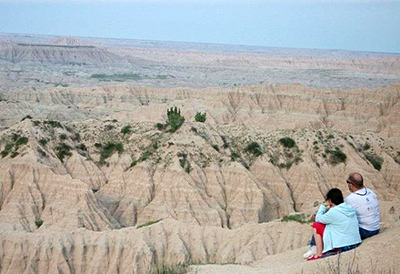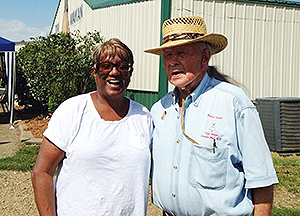By Jeff Brumley
Even the Oglala Lakota Sioux who haven’t embraced Christianity live out gospel values such as family, charity and self-sacrifice, Tennessean Sean Prince says.
Prince is the organizer of an annual mission trip to the Pine Ridge Reservation in South Dakota for his congregation, First Baptist Church of Murfreesboro, Tenn. They’ve visited the same reservation, and the same communities within it, for six summers.
Going back repeatedly, Prince said, has enabled him and others to see first-hand how Native American culture is built on helping and trusting others regardless of personal circumstances.
“And that resonates with me,” Prince said.

It’s taken multiple trips to the same site to fully appreciate the qualities of Native American culture, he added.
“Each year we are touched in ways that are fully unexpected,” he said. “We fully acknowledge that we are more so the beneficiaries of the trip than they are.”
‘Beyond charitable response’
Prince’s observation reflects a trend sweeping American churches, Baptist and otherwise, away from the one-time-visit mission trips to the keep-coming-back variety.
Ministry leaders in locations receiving the visits, as well as those traveling say it’s a better use of money, sweat and love to focus on one project and place over many years.
And the idea has a firm footing already among major Christian organizations as well as individual churches.
“One of the things WMU wanted to do was move beyond the charitable response — the giving of a fish,” said Maria Lynn, adult missions coordinator for Woman’s Missionary Union of Virginia, based in Richmond.
 The previous model accomplished a lot of good through efforts such as clothing and feeding programs, Lynn said.
The previous model accomplished a lot of good through efforts such as clothing and feeding programs, Lynn said.
“But we were praying how we could do more empowering kinds of ministries — teaching them to fish,” she said.
‘Disconcerting … at first’
To accomplish that meant finding a project Baptist churches across the state would find interesting and challenging, and where the need is great.
WMUV found all of that on the Standing Rock reservation, a Lakota Sioux reservation the size of Connecticut that straddles North and South Dakota.
A decade ago, the union partnered with the Roanoke Valley Baptist Association in Virginia, which has a long-standing mission project to the reservation.
Today, WMUV sends about 200 volunteers from churches around the state to its Standing Rock project each summer. An additional 300 go from Virginia either through the Roanoke association or individual groups.
The work they do includes both the “give a fish” and “teach to fish” varieties, Lynn said.
 There are construction teams, Vacation Bible School teams, feeding and clothing teams and a traveling fair team that sets up bounce houses. All rove between the reservation’s 10 communities.
There are construction teams, Vacation Bible School teams, feeding and clothing teams and a traveling fair team that sets up bounce houses. All rove between the reservation’s 10 communities.
But going back each year revealed underlying community problems to the visitors, such as teen suicide. So an equestrian ministry was established to work with troubled youth, Lynn said.
It was also learned through experience that sharing the gospel to Native Americans requires them getting to know and trust you, she said.
 “This was disconcerting for our volunteers at first,” she said, adding that some chose not to return.
“This was disconcerting for our volunteers at first,” she said, adding that some chose not to return.
‘They come home … with fresh eyes’
“The culture there requires that you build relationships first before they are receptive to hearing anything you have to say,” Lynn said.
Building those relationships, she added, of course requires time that has also changed the mission culture of many of the participating Baptist churches.
Many have developed friendships with reservation residents that are nurtured outside the confines of the mission trips. Lynn said Facebook groups have been created where the Native Americans and their visitors keep track of illnesses and deaths.
Some churches report a renewed enthusiasm in local ministries, she added.
“They come home and see their communities with fresh eyes, as well.”
In Tennessee, Prince said he’s also seen the world with fresh eyes since participating in his first encounter with the Sioux six years ago.
One way that’s happened is through their spirituality. The Sioux all believe in a great creator who unites them and inspires a culture that puts others first.
“We really don’t have that off the reservation,” Prince said. “Our culture is such a me-first culture, and when you go on the reservation, you don’t experience that.”
